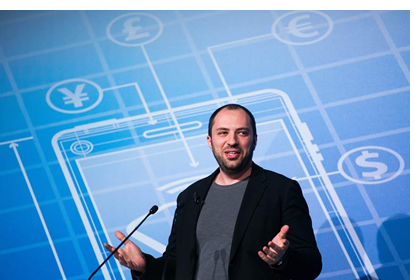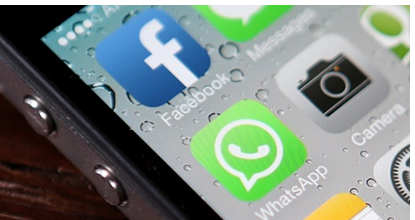Facebook today completed its acquisition of WhatsApp, a mobile chat app with over a half-billion active users that’s surpassed in popularity only by Facebook’s Messenger app. Although the buyout price was $19 billion when the deal was announced last March, the bill now comes to $21.8 billion due to Facebook’s higher stock value.
WhatsApp co-founder and CEO Jan Kuom is joining Facebook’s board, and will receive an annual base salary of just one dollar, like Facebook CEO Mark Zuckerberg. To make up for that, Kuom will also receive $1.9 billion in stock (current value) if he stays with the company for at least four years.
The closing of the WhatsApp acquisition — reported by the SEC today — is quicker than most pundits expected, given that Facebook just won approval for the deal from the European Union’s regulatory agency last Friday. European Competition Commissioner Joaquin Almunia said that the deal “would not hamper competition in this dynamic and growing market. Consumers will continue to have a wide choice of consumer communications apps.”
User privacy worries
 Besides competition, privacy was another big concern of the SEC, FTC, and ECC when reviewing the deal. Facebook is notorious for collecting and selling data about its users, and the company most recently incited ire for forcing its Messenger app on mobile Facebook users. WhatsApp has a much stricter privacy policy, and Koum insists that the company will stick to it by continuing to operate independently after the acquisition.
Besides competition, privacy was another big concern of the SEC, FTC, and ECC when reviewing the deal. Facebook is notorious for collecting and selling data about its users, and the company most recently incited ire for forcing its Messenger app on mobile Facebook users. WhatsApp has a much stricter privacy policy, and Koum insists that the company will stick to it by continuing to operate independently after the acquisition.
“We built WhatsApp around the goal of knowing as little about you as possible,” Koum said in a blog post after the WhatsApp acquisition was announced. “You don’t have to give us your name and we don’t ask for your email address. …We don’t know where you work. We don’t know your likes, what you search for on the internet or collect your GPS location. None of that data has ever been collected and stored by WhatsApp, and we really have no plans to change that.”
Facebook said this past spring that it will continue to market WhatsApp and Messenger as standalone messaging apps, although it has not ruled out merging the two in the future. Facebook also says it won’t place ads in WhatsApp. Instead, the company may rely entirely on premium voice and messaging services as its cash cow — and that cow could become quite a big bovine beast in growing mobile markets.
Google and other competitors
The WhatsApp acquisition will help the company compete not only in the mobile messaging space, but also in the growing mobile Voice-over-Internet Protocol (VoIP) market, with its plan to add “free” VoIP services later this year. WhatsApp will then compete against major mobile VoIP apps like Skype, Line, Viber, Google Hangouts, KakaoTalk, China’s WeChat, and services or apps from major wireless carriers.
Google just recently added calling to its Hangouts app via Google Voice integration, and the company is reportedly working on another mobile chat app — perhaps to augment or replace Hangouts. Unlike Hangouts, the new app would supposedly not require a Google account.





